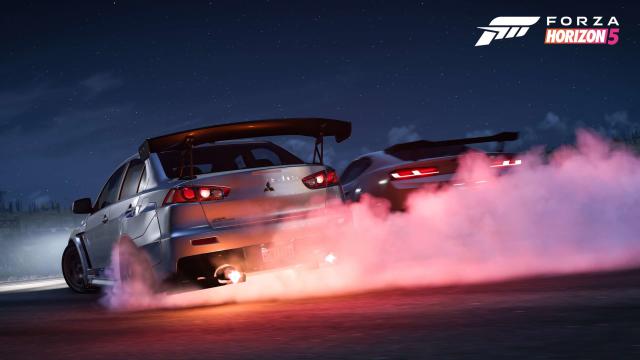The great thing about Forza Horizon is that it brings so many people together. It’s the only racing game I can think of that my non-car people friends enjoy. Forza Horizon 5 doesn’t look to change that; quite the opposite, it seems to have gotten more people talking than ever before.
Yet, as someone who does tend to nerd out over and nitpick little things like the faithfulness of in-game car models, the degree of customisation that can be applied to them and really just accuracy in general, the series has admittedly left me wanting more. It’s very exciting, then, that the audio representation of the cars, engine noises in particular have been massively stepped up for FH5.
Fraser Strachan, Playground Games’ Lead Audio Designer, shined a light on the work that’s gone into improving FH5’s sound on an episode of the studio’s Let’s Go stream that aired Monday. The intricacy of the engine notes can be heard immediately, but before we dive into that, it’s helpful to explain how Playground has been able to make the leap that it has.
It’s thanks to new tech called “granular hybrid looping.” Strachan said that roughly 10 to 15 per cent of Forza Horizon 4’s cars employed this method, but with the new game, the team has been able to apply it to every car in the roster. Here’s how he explained it on the stream:
The old method was essentially a looping method which would take a car — we’d put it in a garage and on a dyno — and get it to play back at like, say, 1,000 RPM, 2,000 RPM, 3,000 RPM. And it was a computer that was doing that, so it was a fairly simulated environment. We’d chop the loops out from those, and play them back.
So there’s a few things — they can sound a little bit like they’re in a garage, and not really out on track. And they can also kind of sound a little bit wrong when you don’t get the engine rotations matching up correctly. So with our new granular synthesis techniques, we actually take the recordings that we get out on track — having driven up to the redline, back down again — we chop each of the individual engine rotations up into a tiny little sample, and we end up with thousands of little audio files that we can play back in the game. And the benefit of granular is that it runs at 90 frames per second, which obviously clocks faster than our game actually runs.
That leaves the team with many more clips, that make engines sound more dynamic and responsive throughout the RPM range. Vacuum cleaners, these are not. Racing game fans have been pining for better audio from every developer since the beginning of time, and Playground has taken those requests to heart. You can hear the results for yourself in the video compilation below, showcasing everything from a Camaro ZL1 to a Morgan 3 Wheeler and a Golf R:
One example among the handful Playground shared was from an A80 Toyota Supra. I’ll admit, I don’t have the most finely-tuned ear for engine notes, and if you ask me to identify a particular car based on the sound it makes alone, I will disappoint you 80 per cent of the time. But even I can pick up the rattling at idle, the raspiness as the Supra’s inline six runs at full tilt and how the pop of each backfire has a unique pitch every single time.
This Supra also highlights just how far Playground went to make sure the sounds of certain cars evolve as they’re upgraded. The blue example in the video actually derives its audio from a heavily modified car the studio borrowed for the game. Strachan says his team sampled notes from a few different Supras, so that the sound of the car as stock — when you buy or win it in the game — will be quite different from where it ends up as you mod it.
That brings us to another facet of how seriously audio is being treated in FH5: audible upgrades. Every powertrain adjustment and even changes in tire size will affect the noises your car makes. You can even test the way a particular part will change the sound of your car as you’re applying them. Here’s how that works, with a Vauxhall Monaro VXR as a subject:
You can tell the aftermarket exhaust adds a fair bit of reverb, upgraded cams and valves adjust the pitch of the Monaro’s V8, and forced induction applies that hiss. This will be music to the ears of many car nerds I know.
There are loads of examples in that first video of how Playground’s new audio tech will transform the sounds of Horizon’s many cars, so I recommend you listen through them all. Also, play close attention to how a car’s surroundings affect the noise it makes. FH5 is using raytracing in an audio context as well as a visual one, something you can hear in the echo of an AMG Project One as it spears alongside a canyon wall. So much attention in this medium is lavished on the visual side of things, so it’s refreshing to hear what can be accomplished when developers apply that same attention and ingenuity to audio. I don’t know about you, but I just became a hell of a lot more excited for Forza Horizon 5.
